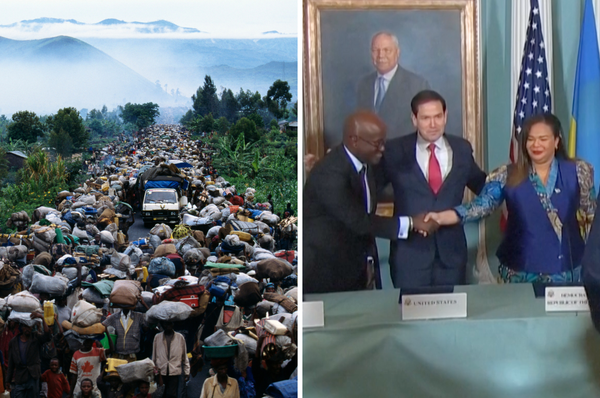🌏 Israel Wants To "Thin Out" Palestinians In Gaza, Japanese Woman Soldier Wins Landmark Sexual Assault Case And More
All the world news you need to know this week.
Hello and welcome to the Almost newsletter, a weekly email to help you stay updated and make sense of important stories happening around the world including:
- 🌏 This Week’s Top Stories
- 👩 Women To Know
- 🙌 Good News For Your Week

A bombshell report has revealed that Israeli prime minister Benjamin Netanyahu wants to “thin out” Palestinians in Gaza “to a minimum”.
The report was published on Dec. 1 by the Israel Hayom newspaper, which is largely seen as a mouthpiece for Netanyahu, according to the Intercept.
Israel Hayom’s report said Netanyahu told his top minister of strategic planning to come up with a plan that not only keeps pushing Palestinians in Gaza into Egypt through the Rafah border crossing, but also to mass expel them to European and African countries by sea.
Israel Hayom reported that the plan was top secret due to its “obvious explosiveness” and sensitivity but that Netanyahu sees it as a “strategic goal”.
It said Netanyahu expects the plan to face opposition from the US and Egypt but believed Israel could overcome Egypt’s resistance “unless Cairo starts shooting Palestinians crossing into the country”.
The report said that pushing Palestinians out of Gaza is not a “transfer” but “freeing” them from the “stranglehold” of Gaza’s borders.
Many have pointed out “thinning out” is just an euphemism for ethnic cleansing, which is the systematic forced removal of an ethnic, racial or religious group from an area to make it ethnically homogenous.
More On The Israel–Hamas War
- The UN has overwhelmingly passed another resolution demanding an immediate ceasefire in Gaza.
- This teen boy in Gaza had to carry another child’s corpse through rain and flood and it’s heartbreaking.
- After this Palestinian poet was killed by Israeli airstrikes, people started translating his last poem into different languages.
- Israeli forces fired a missile towards this Lebanese journalist and killed him while he was reporting on fighting across the Israel–Lebanon border.
- Israel has shared footage of it blowing up a UN-run school in Gaza, saying it was a Hamas base.
- This Israeli advisor was confronted about the stripped Palestinian men and he said it’s warm in the Middle East and he is not familiar with international humanitarian law.
- Israel shared videos of what it says was “Hamas fighters surrendering” but people found lots of signs it was staged.
- This freed Israeli girl hostage shared how Hamas let her keep her dog with her during her time in captivity.
- Meanwhile, Zara has apologized for sharing a new campaign that resembles scenes of destruction in Gaza.
Also Happening Around The World
🇰🇷 BTS’ final four members have begun serving in South Korea’s mandatory military service.

In a landmark moment, this Japanese woman soldier sued three male colleagues for sexually assaulting her and won.
24-year-old Rina Gonoi said that she had wanted to join the army as a child after she saw troops helping victims of an earthquake and tsunami in 2011.
But she said after she joined the military, she faced constant sexual harassment, with male colleagues sexually commenting on her body and breast size and even asking her to give them blow jobs.
Then in August 2021, three male colleagues pinned her to the bed, forcibly spread her legs open and rubbed their crotches against her sexually. She said the incident happened in front of several other people, but no one intervened and some people even laughed.
Gonoi said she reported the incident to senior officers but they dismissed her over “lack of evidence”. After no action was taken, Gonoi eventually decided to leave the military.
In 2022, she took the rare step to go public and share her story on YouTube, drawing attention worldwide and in Japan, where speaking out against gender violence still remains a taboo.
After her video went viral, Japan’s defense ministry issued an apology and said it had dismissed five men in connection to the assault.
It also pressured authorities to launch an official investigation into sexual violence in the military, which uncovered about 1,400 cases of sexual harassment and bullying, most of which had not been reported.
Gonoi then sued the three men, who were found guilty on Tuesday Dec. 12 and sentenced to two-year suspended prison sentences.

For the first time, countries have agreed to “transition away” from fossil fuels to fight climate change.
The agreement was announced on Wednesday Dec. 13 at the end of COP28, the UN’s annual climate change conference, in Dubai, UAE, after 2 weeks of negotiations between nearly 200 countries.
This is the first agreement in COP’s history to explicitly state that it is necessary to shift away from fossil fuels, thus recognizing their role as drivers in the climate crisis.
It calls for countries to “transition away” from fossil fuels in a “just, orderly and equitable” manner this decade to reach net zero by 2050.
However, the agreement was a last minute compromise that does not call for “phasing out” fossil fuels, which means stopping the use of coal, gas and oil.
More than 100 countries, from small island countries – which are the most hard hit by the effects of the climate crisis – to Western superpowers including the US, UK and the EU, had all been fighting for the stronger phrase of “phase out”.
The president of COP28, Sultan Al Jaber, who is the CEO of the UAE’s state oil company, hailed it as a historic moment.
At the conference, countries also committed US$700 million to the “loss and damage” fund that helps pay for climate change damages in poor countries.
However, activists and rights groups say that the number is not nearly enough and that US$400 billion is needed.
More Good News For Your Week
🇦🇺 Australian firefighters posed for their annual charity calendar and it’s literally too hot to handle
Thanks so much for opening this email. If you think a friend would like this, you can forward it to them! You can also follow Almost on Instagram, TikTok or YouTube. We also have a Chinese version.
Let us know your thoughts about this week’s news in the comments or by replying directly to this email ✨





